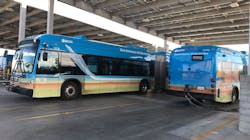More than $154 million in FY19 BUILD grants awarded to transit projects
The U.S. Department of Transportation (USDOT) released the full list of FY19 Better Utilizing Investments to Leverage Development (BUILD) Transportation Discretionary Grants program recipients on Nov. 12.
“The administration is targeting BUILD Transportation grants to repair, rebuild and revitalize significant infrastructure projects across the country,” said U.S. Secretary of Transportation Elaine L. Chao.
USDOT had $900 million in available funding for the FY19 round of BUILD grants and selected 55 projects to receive funds based on criteria that encompassed safety, economic competitiveness, quality of life, state of good repair, environmental sustainability, innovation and partnerships with a broad range of stakeholders.
In total, transit-specific and transit-related projects accounted for $154.8 million of the $900 million in awarded BUILD grants, which is about 17.2 percent. When compared to FY18 BUILD grants, transit is down slightly in total dollars awarded ($154.8 million versus $195 million), but the percentage awarded is up (17.2 percent versus 13 percent). Mass Transit previously reported $78.18 million was awarded to five transit-related projects in four states. With USDOT’s official list, the number of projects grows to 10 across seven states.
The list of transit-specific and transit-related projects to be awarded FY19 BUILD grants include (previously reported grants appear in italics):
- $8.68 million to Antelope Valley Transit Authority in Lancaster, Calif., for the purchase of approximately eight 40-foot and twelve 30-foot zero-emission, battery-electric transit expansion buses, as well as their corresponding chargers.
- $12 million will help the Memphis Area Transit Authority to create a BRT line along the eight-mile designated Innovation Corridor linking downtown Memphis to the Medical District, along the Overton Square entertainment district, past the Benjamin L. Hooks Central Library on Poplar and on to the University of Memphis campus.
- $12.58 million to Delaware River Port Authority in Philadelphia, Penn., for the PATCO Franklin Square Station Reopening Project, which will revitalize and reopen an existing rail station consistent with modern Americans with Disabilities Act (ADA) requirements.
- $13 million to Normal, Ill., to design and construct a pedestrian, bicyclist, and passenger underpass as well as a second boarding platform on the south side of the tracks at the Uptown Normal Intermodal Passenger Rail Station.
- $13.98 million awarded to the city of Carbondale, Ill., for the Southern Illinois Multimodal Station (SIMMS) project, which will fund both the design and construction of a new multi-modal transportation center in the city’s downtown, as well as the demolition of the existing Amtrak station. The project will also include the region’s first bike sharing service.
- $17.2 million awarded to the city of Ruston and $15 million awarded to the city of Baton Rouge, La., for bus and smart cities infrastructure. Baton Rouge will use the money to fund the Plank-Nicholson BRT line, Louisiana’s first, which will stretch nine miles across the city to connect northern and southern Baton Rouge to downtown and Louisiana State University. Ruston will fund improvements to the Monroe Street Corridor Project that will serve as a Smart Cities Innovation Testbed, which will embed sensors and provide real-time data for traffic, parking, environmental conditions and create a network needed to research and develop autonomous vehicles.
- $20 million to Orange County, Fla., for the Orange County Local Alternative Mobility Network Project, which will construct shared mobility lanes; dedicated rights of way (ROW); recovery zones for user equipment repairs, rest and hydration; sheltered waiting areas; upgrading of existing pedestrian and bicycle paths; naturally shaded and streetscaped. environments; wayfinding; a transit hub; autonomous vehicle infrastructure facilitating local adoption of AVs.
- $20 million awarded to the state of Hawaii to help build a new pedestrian bridge over Ala Moana Boulevard. The new bridge will connect Ala Moana Beach Park and Kewalo Harbor to Ward Village, the Ala Moana Center and the future Ward rail station.
- $22.36 million to Miami-Dade County Department of Transportation and Public Works for the Underline Multimodal Mobility Corridor Project, which will fund the design and construction of enhancements to a 10-mile corridor including separated bike and pedestrian facilities, lighting, wayfinding and intersection safety improvements. This work it will also improve multimodal access to eight Metrorail stations and bus terminals allowing for increased ridership.
The FY19 BUILD grants had several parameters, such as no single state could receive more than $90 million in total grants and single grant recipients were capped at $25 million. Additionally, USDOT awarded half of the available BUILD grants to rural projects, which the department says reflects “the administration’s ongoing effort to rebalance historic underinvestment in rural America.”
A full description of every project awarded a BUILD grant in this round is available at USDOT’s website.
About the Author

Mischa Wanek-Libman
Group Editorial Director
Mischa Wanek-Libman is director of communications with Transdev North America. She has more than 20 years of experience working in the transportation industry covering construction projects, engineering challenges, transit and rail operations and best practices.
Wanek-Libman has held top editorial positions at freight rail and public transportation business-to-business publications including as editor-in-chief and editorial director of Mass Transit from 2018-2024. She has been recognized for editorial excellence through her individual work, as well as for collaborative content.
She is an active member of the American Public Transportation Association's Marketing and Communications Committee and served 14 years as a Board Observer on the National Railroad Construction and Maintenance Association (NRC) Board of Directors.
She is a graduate of Drake University in Des Moines, Iowa, where she earned a Bachelor of Arts degree in Journalism and Mass Communication.
